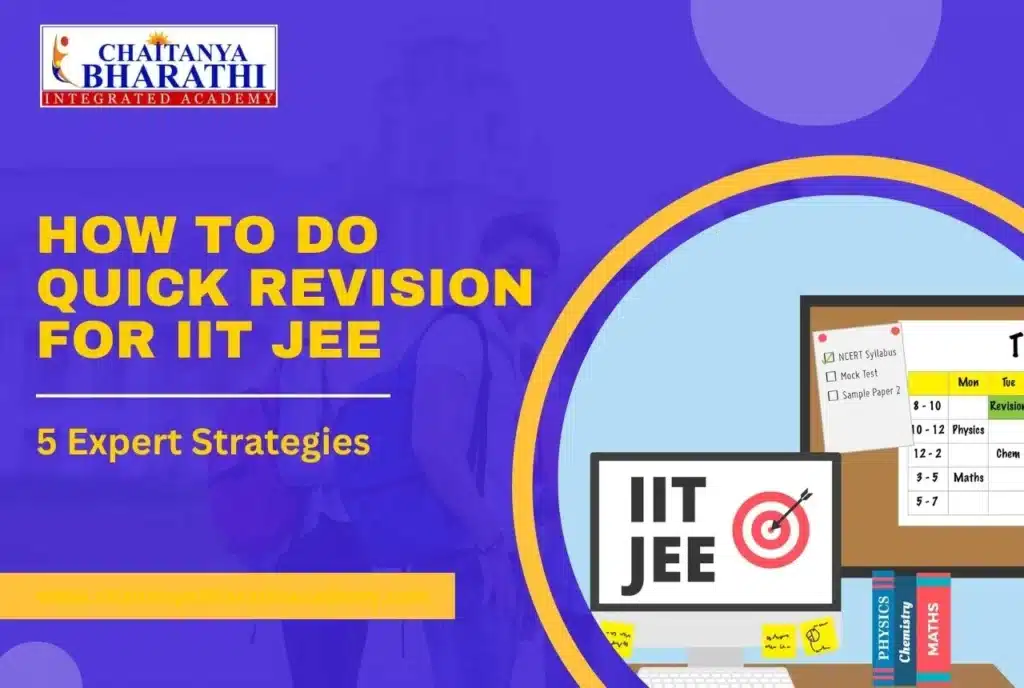The final weeks before the IIT JEE are when knowing how to do quick revision for IIT JEE can determine whether years of preparation lead to success or missed opportunities. At this crucial stage, mastering quick revision techniques can set top-performing students apart. With lakhs of aspirants competing for limited seats in the IITs, effective revision isn’t just helpful—it’s essential.
Data shows that students who follow structured revision strategies perform significantly better in mock tests and real exams. This blog explores five proven techniques to help you revise quickly and efficiently without overwhelming yourself.
Whether you’re aiming for JEE Main or Advanced, the right revision approach can boost both your confidence and performance. Read on to learn how you can structure your final weeks and optimize every hour to give your best shot at cracking the IIT JEE.
How to Do Quick Revision for IIT JEE: Essential Foundation
Quick revision differs from regular study in both purpose and pace. While regular study is for building knowledge, quick revision is about reinforcing key concepts and fine-tuning your problem-solving skills. In the context of how to do quick revision for IIT JEE, this phase is critical to consolidating learning and avoiding last-minute confusion.
Many students make the mistake of either cramming or attempting to cover too many new topics during this period. Instead, the focus should be on conceptual clarity, practicing known problems, and identifying weak areas. Ideally, start quick revision at least a month before the exam to avoid stress buildup.
It’s also essential to recognize that revision approaches for JEE Main and Advanced differ—Main focuses more on speed and accuracy, while Advanced emphasizes deeper understanding. Avoid rote learning; instead, revisit formulas, concepts, and logic behind problem-solving. Finally, be realistic: quick revision won’t help you master a topic from scratch, but it will strengthen what you already know.
5 Proven Strategies for Effective IIT JEE Quick Revision
1. Create a Strategic Revision Schedule and Prioritize High-Weightage Topics
To make the most of your limited time, it’s important to understand how to do quick revision for IIT JEE effectively. Start by analyzing the syllabus weightage for Physics, Chemistry, and Mathematics. This helps you prioritize topics that carry the most marks. Identify your strengths and weaknesses to allocate time accordingly—spend more time reinforcing weaker areas, but don’t neglect your strong subjects.
Divide your daily revision into 40–60 minute blocks with short breaks in between to prevent fatigue. Include mock test slots within your weekly schedule. Flexibility is key—leave space for unpredictable delays or a second round of tough topics.
For example, Chaitanya Bharathi coaching institute in Guwahati helps its students design personalized revision plans based on previous performance and mock test scores. A planned yet adaptable approach will ensure consistency and reduce last-minute panic.
2. Master the Art of Condensed Note-Making and Formula Sheets
Effective note-making is the backbone of a strong revision strategy. Create concise notes that distill key points, formulas, reactions, and tricks from your textbooks and coaching materials.
Use visual tools like flowcharts, mind maps, and diagrams to make your revision more interactive. Flashcards—digital or paper—are great for memorizing facts, especially in Chemistry. Color-code topics based on difficulty levels to prioritize during daily revision sessions.
Handwritten notes often have better recall value, but digital tools allow quicker edits and sharing. Create separate formula handbooks for each subject, and use mnemonics to remember tricky equations and chemical reactions. Your goal is to have a quick reference sheet you can flip through the day before the exam.
3. Implement Strategic Practice Through Previous Years’ Papers and Mock Tests
One of the smartest ways to reinforce your preparation is through strategic practice of previous years’ JEE papers. Solving at least the last 10 years’ questions helps in understanding exam trends, frequently asked topics, and difficulty levels.
Schedule time-bound mock tests two to three times a week and simulate real exam conditions. Post-test analysis is crucial—review your mistakes and focus revision on those topics. Track your performance to see if your accuracy and time management are improving.
Use platforms like NTA mock portals or join curated test series. Chaitanya Bharathi’s mock test series is specifically designed to help students in Assam prepare efficiently, with adaptive difficulty levels and analytics support to pinpoint exact areas needing improvement.
4. Focus on Conceptual Clarity and Problem-Solving Techniques
In your revision phase, understanding how to do quick revision for IIT JEE means avoiding the temptation to dive into new topics. Instead, focus on reinforcing core concepts and ensuring you understand their applications. Revisit derivations, formula logic, and conceptual interlinks across chapters.
- For Physics, focus on problem-solving and formula application.
- In Chemistry, prioritize NCERT theory, reaction mechanisms, and organic chemistry tricks.
- For Mathematics, review common solving patterns, shortcuts, and frequently used theorems.
Use question banks and coaching material to practice high-concept problems that involve multiple chapters. Repeating these helps in faster recall during the exam. Also, train yourself to avoid silly mistakes by practicing in a distraction-free environment. This builds not just accuracy, but also confidence.
5. Maintain Optimal Health and Stress Management During Revision
Your physical and mental health plays a massive role during revision. Aim for 7-8 hours of sleep every night to keep your brain sharp and focused. A balanced diet with brain-boosting foods—like fruits, nuts, and proteins—can improve memory and stamina.
Daily exercise, even light walking or stretching, reduces mental fatigue. Practice meditation or deep breathing for 10 minutes a day to manage anxiety and increase focus.
Avoid burnout by taking regular breaks and staying away from excessive screen time or social media distractions. Create a peaceful and organized study space. If you feel overwhelmed, talk to mentors, friends, or parents. Confidence-building techniques, like visualizing exam success or revisiting your achievements, can keep you motivated throughout your revision journey.
Additional Quick Revision Tips for Maximum Efficiency
- Opt for group discussions to clarify doubts and strengthen memory through peer learning.
- Use apps and digital platforms for fast quizzes, flashcards, and formula recaps.
- The day before the exam, focus only on light revision—no new topics.
- Prepare backup revision material for topics you tend to forget.
- Practice mental math and quick elimination techniques for exam day.
- Stay informed about any updates in the exam pattern.
- Coaching centers like Chaitanya Bharathi provide last-minute strategy sessions and expert advice.
Wrapping Up: Your IIT JEE Quick Revision Strategy
Now that you know how to do quick revision for IIT JEE, it’s time to act. The five key strategies—creating a smart schedule, making concise notes, solving past papers, strengthening concepts, and managing health—can dramatically enhance your final prep phase. Remember, consistent execution matters more than perfection.
So take charge of your preparation with discipline and focus. Start implementing these techniques today and move closer to your IIT dream. With structured revision and the right support—like that from Chaitanya Bharathi in Guwahati—you can approach exam day with clarity and confidence.
Stay focused, stay motivated—and success will follow.












